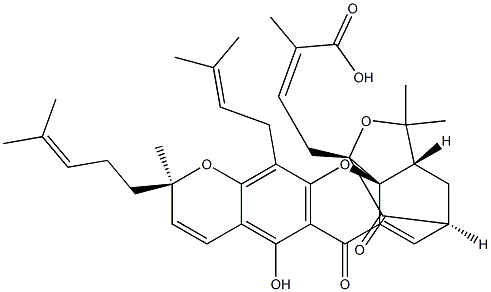Gambogic acid (GA) is a natural product isolated from the G. hanburyi tree that exhibits anti-cancer activity by acting on a variety of cellular pathways. In the apoptotic pathway, GA activates caspases (EC50 = 0.78 μM), inhibits binding of anti-apoptotic proteins to a BH3 peptide (IC50 = 1.47, 1.21, 2.02, 0.66, 1.06, 0.79 μM for Bcl-xL, Bcl-2, Bcl-W, Bcl-B, Bfl-1, Mcl-1, respectively), and alters expression of Bcl-2 and Bax. GA binds to the transferrin receptor (IC50 = 4.1 μM), inducing apoptosis in various tumor cell lines. It is a potent, slow inhibitor of Kir2.1 channels (IC50 = <100 nM). GA inhibits the chymotrypsin activity of the 20S proteasome in a dose-dependent manner. A novel mechanism for GA cytotoxic effects in glioma cells may be through AMPK-initiated effects on EGFR and Akt/mTORC1 signaling.

